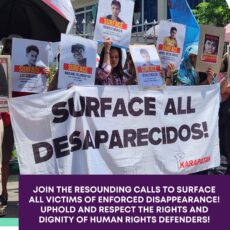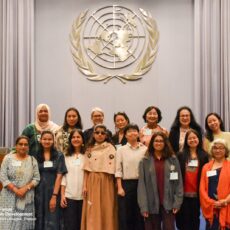The Center for Women’s Resources (CWR) stands in solidarity with the Filipino people, especially women, children, and other marginalized sectors, in demanding rightful compensation for the devastating impacts of disasters in their communities. The series of catastrophic events in recent weeks have laid bare the deep vulnerabilities of women. As the effects of the climate crisis become more pronounced, communities across the country are grappling with a cycle of poverty, hunger, loss of lives and livelihoods, and limited access to basic services.
In recent weeks, the death toll from the combined effects of Severe Tropical Storm Kristine (Trami) and Typhoon Leon (Kong-rey) has reached 160, according to the National Disaster Risk Reduction and Management Council (NDRRMC). More than 9.6 million Filipinos were affected, including 617,168 who have been displaced from their homes.
Women, who already bear the disproportionate effects of poverty, are increasingly tasked with the burden of securing food, shelter, and care for their families amid disaster and displacement. As primary caregivers, a role determined by gender norms and societal expectations, women face greater demands during such crises.
Olivia Bajas, a resident of Brgy. Tumana, Marikina, faced the daunting task of cleaning the thick mud left inside her house followingTyphoon Carina and the southwest monsoon or habagat. She was unsure how to recover from such a devastating impact—there was no food and the flood waters had reached as high as their roof. The Marikina City LGU also recorded 31,128 evacuees across35 evacuation sites in the city.
In Bicol, Severe Tropical Storm Kristine affected more than 4.2 million Filipinos, which is approximately 986,974 families.. The storm has resulted in a death toll of 81, with 66 individuals injured, and 34 reported missing. As of October 28, the total damage to agriculture and infrastructure is estimated at Ph 3 billion.
In Cagayan, Typhoon Marce, which had the worst impact according to Gov. Manuel Mamba, caused Php 1.4 billion damage to agriculture, Php 25.3 million damage to infrastructure, and displaced 29,808 people, or 9,959 families, across 245 barangays.
According to NDRRMC, there are 1,145,942 individuals or 295,576 families affected by tropical cyclones Nika, Ofel, and Pepito in Northern Luzon. The cyclones also partially damaged 7,401 houses and totally damaged 437 others.
Low wages and income and rising cost of living make it nearly impossible for these families to recover, let alone rebuild their lives.
What exacerbates this situation is the environmental destruction caused by large-scale mining and quarrying operations and other large-scale resource extraction activities—many of which are controlled by local and foreign corporations and allowed to operate by the government. These activities are not only extracting our natural resources but also destroying vital ecosystems that protect our communities from the worst effects of the climate crisis.
The aggressive implementation of development projects that often disregard the rights and welfare of local communities, and the environment also contribute to the degradation of natural habitat, disruption of livelihoods and displacement of communities.Many of these projects require land use conversion and reclamation, which further accelerate deforestation and biodiversity loss.
According to Kalikasan, there are currently 19 mining projects operating in Rizal covering 3,622 hectares.. Two hydropower projects, the Kaliwa-Kanan Laiban Dam and the Wawa Dam, are also ongoing. When Typhoon Enteng hit the province in September, eight people lost their lives due to drowning and landslides.
As the world watches the ongoing COP 29 in Baku, Azerbaijan, we must remain critical of the false solutions being peddled by corporate interests. Many of the proposed solutions focus on technological fixes, market-based mechanisms, and greenwashing, which fail to address the systemic drivers of the climate crisis. Despite the urgency of the crisis, big polluting corporations from imperialist countries continue to evade accountability.
The Filipino people must demand justice and accountability. Particularly, those affected must be compensated for the loss of lives, livelihoods, and damage to properties. The Filipino people must unite to demand that the Philippine government end its complicity in extractive and destructive mining and quarrying and instead, take a stand for the protection of the people and our environment. We call on everyone to unite in the struggle to fight for compensation, to demand real solutions to the climate crisis, and to hold accountable those who continue to profit at the expense of our environment and our lives.



